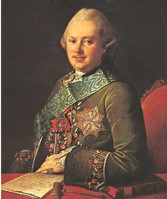
Birthday anniversary of Alexander A. Vyazemsky, Prince, Procurator General of the Senate, Chair of Law Systematization Commission
«Count Vyazemsky was faithful to the throne,
disinterested, very industrious,
knew how to choose worthy assistants.”
D. N. Bantysh-Kamensky, historian
3 (14) August 1727 in the family of naval lieutenant was born Alexander A. Vyazemsky, Prince, Privy Councillor, one of the closest officials of the Russian Empress Catherine II, procurator-general of the Senate (1764-1792), chairman of the Legislative Commission (1767), a member of Council at the Imperial Court (1769), honorary member of the St. Petersburg Academy of Sciences (1776).
A descendant of an old noble family, Vyazemsky, after graduation from the Land Cadet Corps in 1747 served in the army, and by the end of the Seven Years' War (1756-1763) had become Quartermaster General. With the ascension to the throne of Catherine II, Vyazemsky’s career began to flourish. In 1763 he headed a commission for investigation of the causes and circumstances of the unrest by mining and metallurgical workers of the Urals, and studied the situation of mining plants. Under the instructions of the Empress, he tried to resolve the conflict peacefully, avoiding the use of force. In his report to Catherine II, one of the reasons for unrest he called the abuses by factory owners.
In February 1764 Vyazemsky was appointed procurator-general of the Senate and served in that position until retirement in September 1792. During the period of service, he enjoyed the confidence of the Empress, as one of her closest advisers. At his appointment to the position, Catherine II provided him personally with a detailed confidential written statement of the ten items that clearly defined the duties of Vyazemsky as procurator-general. In the instruction the Empress stressed the abuse in the Senate, wrote about the reasons for removal of the prior procurator-general. She also outlined measures for the "multiplication of circulation of money", improvement of laws, eradication of korchemstvo - the secret trade of goods which represent the monopoly of the Treasury; suggested an active work for a closer rapprochement between Russia and Little Russia, Livonia, and Finland.
Vyazemsky, despite the dislike of persons close to Empress, remained at the post of general prosecutor for about 29 years, proved himself an active and enthusiastic executor of all instructions of Catherine II. He supervised the observance of laws in the Senate, the activities of the Senate Chancellery. Vyazemsky organized in the Senate various departments, which created the possibility of faster and more accurately solve the problems. With these innovations the authorities of the prosecutor-general had expanded: he was in charge of a number of central institutions and the control of the finances, taxation, trade, mint case. In fact, Vyazemsky was Acting Minister of Finance and head of government, being one of the major implementers of Catherine's reforms. In 1767, he has centralized and streamlined financial reporting, and in 1769 the Senate composed an accountant book of government revenue.
In 1765, Vyazemsky led a land surveying expedition. In 1766-1767 he was assigned to organize a Commission to develop a new Code of laws for the preparation of a general set of laws relating to all aspects of life of the Russian society. After the formation of the Commission, Vyazemsky was appointed its chairman. Soon he wrote a manual for public chambers - the basic institutions of governorships; later he took part in the development of the "Constitution for the Administration of Governorates", which determined the statute of provinces replacing the governorships. From 1775 Vyazemsky also became head of the Office of the custody of foreign subjects.
Under the supervision of the procurator-general Vyazemsky, in Catherine's reign the swamps around St. Petersburg had been drained, the Catherine Canal constructed, the Embankment of Fontanka River landscaped. In 1776 Vyazemsky was elected honorary member of the St. Petersburg Academy of Sciences.
In the second half of 1780s Vyazemsky contributed to the first attempts of compiling the state budget. He also oversaw the work of the Secret Expedition of the Senate - the principal organ of political investigation. Under the command of Vyazemsky served another famous Russian poet G. R. Derzhavin, who, under the patronage of the procurator-general, was able to move out to serve in the Senate.
At the age of 62 Vyazemsky became paralyzed. Due to illness he was unable to perform his duties adequately, and two years later asked to resign.
For the "diligence, dedication and excellent service" Vyazemsky had received numerous awards, being a holder of Russian orders of St. Andrew the Apostle, St. Blessed Grand Prince Alexander Nevsky, St. Vladimir, 1st grade, St. Anne, as well as Polish Order of the White Eagle.
8 (20) January 1793 Alexander A. Vyazemsky died and was buried in the cemetery of the Alexander Nevsky Lavra.
Lit.: Иванов П. И. Опыт биографий генерал-прокуроров и министров юстиции. СПб., 1863; Князь Вяземский // Изображение и характеристика лиц, занимающих первые и главные места при Петербургском дворе. (1783) / Публ. Н. Григоровича // Русский архив. 1875. Кн. 2. Вып. 6. С. 120-121; Орлов А. С. Волнения на Урале в 50-60-е годы XVII в. и экспедиция А. А. Вяземского — А. И. Бибикова : автореф. дис. … к. и. н. М., 1971; Письма императрицы Екатерины II к князю А. А. Вяземскому // Русский архив, 1865. М., 1866.
Based on the Presidential Library’s materials:
Иванов П. И. Опыт биографий генерал-прокуроров и министров юстиции. СПб., 1863. С. 41-56.

